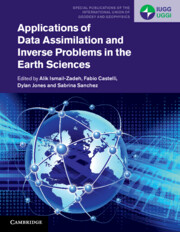Book contents
- Applications of Data Assimilation and Inverse Problems in the Earth Sciences
- Series page
- Applications of Data Assimilation and Inverse Problems in the Earth Sciences
- Copyright page
- Contents
- Contributors
- Preface
- Acknowledgements
- Part I Introduction
- Part II ‘Fluid’ Earth Applications: From the Surface to the Space
- 5 Data Assimilation of Seasonal Snow
- 6 Data Assimilation in Glaciology
- 7 Data Assimilation in Hydrological Sciences
- 8 Data Assimilation and Inverse Modelling of Atmospheric Trace Constituents
- 9 Data Assimilation of Volcanic Clouds: Recent Advances and Implications on Operational Forecasts
- 10 Data Assimilation in the Near-Earth Electron Radiation Environment
- Part III ‘Solid’ Earth Applications: From the Surface to the Core
- Index
- References
7 - Data Assimilation in Hydrological Sciences
from Part II - ‘Fluid’ Earth Applications: From the Surface to the Space
Published online by Cambridge University Press: 20 June 2023
- Applications of Data Assimilation and Inverse Problems in the Earth Sciences
- Series page
- Applications of Data Assimilation and Inverse Problems in the Earth Sciences
- Copyright page
- Contents
- Contributors
- Preface
- Acknowledgements
- Part I Introduction
- Part II ‘Fluid’ Earth Applications: From the Surface to the Space
- 5 Data Assimilation of Seasonal Snow
- 6 Data Assimilation in Glaciology
- 7 Data Assimilation in Hydrological Sciences
- 8 Data Assimilation and Inverse Modelling of Atmospheric Trace Constituents
- 9 Data Assimilation of Volcanic Clouds: Recent Advances and Implications on Operational Forecasts
- 10 Data Assimilation in the Near-Earth Electron Radiation Environment
- Part III ‘Solid’ Earth Applications: From the Surface to the Core
- Index
- References
Summary
Abstract: Hydrological sciences cover a wide variety of water-driven processes at the Earth’s surface, above, and below it. Data assimilation techniques in hydrology have developed over the years along many quite independent paths, following not only different data availabilities but also a plethora of problem-specific model structures. Most hydrologic problems that are addressed through data assimilation, however, share some distinct peculiarities: scarce or indirect observation of most important state variables (soil moisture, river discharge, groundwater level, to name a few), incomplete or conceptual modelling, extreme spatial heterogeneity, and uncertainty of controlling physical parameters. On the other side, adoption of simplified and scale-specific models allows for substantial problem reduction that partially compensates these difficulties, opening the path to the assimilation of very indirect observations (e.g. from satellite remote sensing) and efficient model inversion for parameter estimation. This chapter illustrates the peculiarities of data assimilation for state estimation and model inversion in hydrology, with reference to a number of representative applications. Sequential ensemble filters and variational methods are recognised to be the most common choices in hydrologic data assimilation, and the motivations for these choices are also discussed, with several examples.
Keywords
- Type
- Chapter
- Information
- Publisher: Cambridge University PressPrint publication year: 2023

